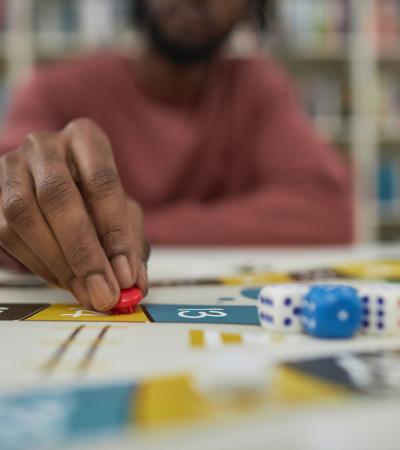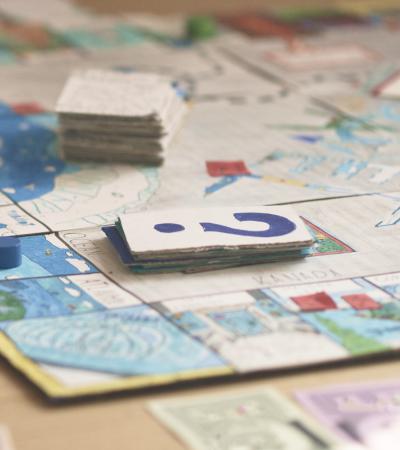Ever think about starting a tabletop game collection at your library? If you're a game enthusiast, you could probably come up with a whole list of ideas that would blow your patrons' minds — and your library's budget. Board games, after all, can be both exciting and pricey.
But if you can solicit donations of gently used games — or find them for cheap — you might be able to amass a larger collection that you thought possible.
For those who are just getting started, here’s a list of the most popular games we have at the LP Fisher Public Library. Prices vary depending on where you buy them (we like secondhand!) and which versions you get (many games come in multiple versions, and some have expansion sets).
The following list covers classic games. Part 2 of this series will cover lesser-known but still awesome titles. Consider this a jumping-off point!
-
Image

Portable Chess Sets. We have many of these because we have a chess club and also host tournaments. We also have a chess timer (also known as a chess clock). The chess sets are easy to store and clean (they come in tubes, boxes or bags, depending on the model). Our favorites are the ones that have a fabric mat that rolls up and stores in a tube. Chess is a great game to play between people who speak different languages because you don't need to do much talking. For libraries that require low-noise, this is a winner.
- Checkers (also known as Draughts). A classic for a reason. Teaches math skills and strategy. Can be found cheaply and in travel sets.
- Snakes and Ladders (also known as Chutes and Ladders). Good for teaching patience, counting skills, and turn taking for all ages. If you can find a fold-up board, even better.
- Jenga. Wooden blocks that you stack and topple to great delight. A pain to store but worth it. Once the original paper box breaks you'll need a container to house all the blocks in. It will rip within days of use, so be warned.
- Scrabble and Scrabble Junior. Great games for building vocabulary. You might want to have a Scrabble Dictionary for players lest fights break out over spelling variations!
- Monopoly and Monopoly Junior. Monopoly also has tons of variations and spin-offs (like the Pokemon version, for example) that target various audiences. These classic real estate games take a while to play. If you aren't lending for take-home play, assume people will be using this game for at least an hour or two. Strategy games like Risk take even longer. We have a copy of Risk but no one ever plays it on our Family Board Game Nights because it just takes too long.
- Harry Potter Trivial Pursuit. You could buy regular Trivial Pursuit or other variations, but why bother? The Harry Potter version is the one everyone is going to want to play. I suggest you buy two. Trust me.
- Battleship. This game is so popular at my library that we regularly hold Battleship Tournaments and have even done a full-scale HUMAN Battleship game. We also have the Star Wars version (fighting in space!), which patrons adore.
- Connect Four is another one of those games that almost anyone enjoys playing. It's super for teaching kids how to take turns, count and think ahead. If you have issues with being impulsive this game teaches the value of slooowing doooown. We hold at least one Connect Four Tournament a year (with prizes!). It's always a good time. You can get these games cheap and often find them at yard sales. Kids LOVE releasing the trap at the bottom and hearing all the tokens fall out.
- Candy Land may be horribly boring for adults, but I have never found a child who doesn't like playing it. You can almost always find a copy for under $10 brand new. Buy two.
- Clue (also known as Cluedo). The classic "whodunnit" game for three to six players. Also comes in many versions, including Junior for younger players.
- Guess Who? This two-player guessing game is very popular with kids and adults and comes in lots of variations. It's great for working on social skills because you have to take turns asking questions of the other player. (Of course, that also leaves room for cheating!)
- Sorry. Players take turns drawing cards and avoiding the "Sorry" card while moving their piece around the board. Simple, easy fun for all ages.
- The Game of Life promotes capitalism and the accumulation of wealth while going through the motions of getting a job and getting married and having babies and generally following a heteronormative lifestyle (all while driving a convertible!). Who ever retires with the most money wins. People love it. To each his own.
You can find more extensive game reviews by players all over the internet, but one of the most comprehensive sites is BoardGameGeek. You can also watch videos of celebrities and friends of Will Wheaton’s play games at Wheaton’s TableTop.
Not sure what to do with all these games once you get them? Check out some programming ideas from this blog under “Related Links” below. Be sure to check out the Program Model: Circulating Board Game Collection for more tips on how to get started.



